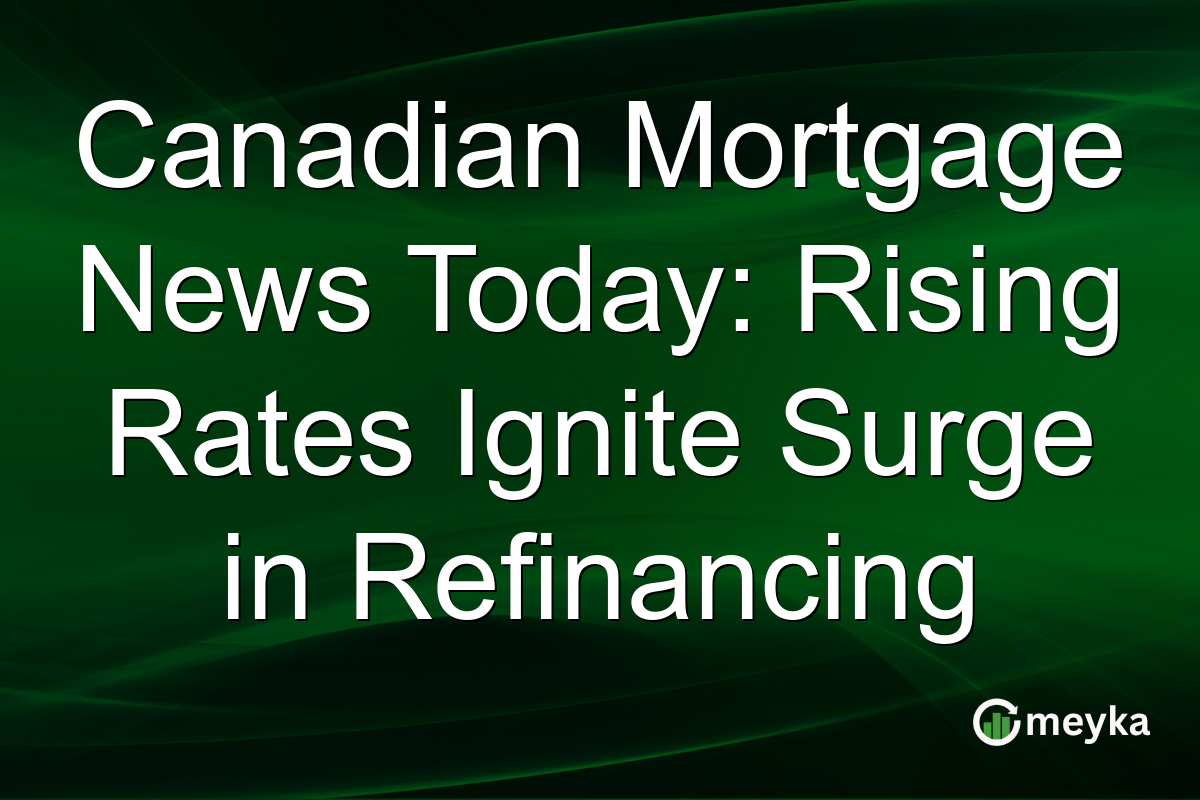Canadian Mortgage News Today: Rising Rates Ignite Surge in Refinancing
The Canadian mortgage market is currently experiencing a surge in refinancing activity, driven by rising interest rates and uncertainty in the housing market. As borrowers rush to lock in existing rates before further increases by the Bank of Canada, this trend is significantly impacting both new loan demand and the broader economic landscape. Examining the latest developments, we can see how these dynamics are shaping financial decisions and the future of Canadian housing.
Current Landscape of Canadian Mortgage Rates
As of 2025, Canadian mortgage rates have surged, prompting many homeowners to act swiftly. Recent reports indicate that the central bank’s decisions have triggered alarm among borrowers. The Bank of Canada has steadily increased rates to combat inflation, pushing borrowers to refinance en masse. Currently, fixed-rate mortgages have risen to around 6.5%, up from 4.7% earlier this year. This significant increase has made refinancing an attractive option for many. Homeowners aim to avoid potential future hikes while benefiting from their existing low rates. This shows a clear shift in borrower sentiment and priorities. Recent CNBC article confirms these trends, highlighting the urgency with which homeowners are approaching refinancing today.
Mortgage Refinancing Trends and Housing Market Impact
Refinancing has become the hottest trend in Canada’s mortgage market this year. According to data from major Canadian banks, refinancing applications have increased by over 30% in recent months. This rush reflects a broader concern that interest rates may yet climb further. While refinancing activity rises, new mortgage applications have seen a slowdown. Higher borrowing costs have deterred potential homebuyers, cooling the once red-hot housing market. The sharp rise in refinancing shows the preference to hold on to current homes rather than seeking new properties. As the housing market adjusts, regions like Toronto and Vancouver are witnessing significant fluctuations. Such volatility may continue as long as interest rate uncertainties persist.
Interest Rate Impact on the Canadian Economy
The impact of rising interest rates extends beyond individual homeowners. It has broader implications for the Canadian economy. As mortgage rates climb, consumer spending is expected to tighten. Households may allocate more income toward debt servicing rather than expenditures. This reduction in spending can slow economic growth, affecting various sectors including retail and construction. Analysts warn that prolonged high rates could lead to economic stagnation. The Bank of Canada faces the challenge of balancing inflation control with sustainable economic growth. Investors are keeping a close watch on these trends, seeking insights into future monetary policy decisions. Understanding these signals is crucial for navigating Canada’s financial landscape in 2025.
Future Outlook for Canadian Mortgage Rates
Looking ahead, experts predict that Canadian mortgage rates may continue to rise if economic conditions don’t shift dramatically. Inflation remains a pressing concern, and the Bank of Canada’s rates could increase further in response. For Canadian homeowners, this means a continued push to refinance as soon as possible. Those considering new home purchases might face even higher borrowing costs, leading to more cautious financial planning. The housing market in Canada will likely see ongoing adjustments as rates evolve. Adapting to this environment is crucial for investors and homeowners alike, with many turning to platforms like Meyka for real-time financial insights and predictive analytics to guide their decisions.
Final Thoughts
In conclusion, the surge in refinancing among Canadian homeowners underscores a significant shift in the mortgage landscape for 2025. With interest rates rising and the housing market showing signs of cooling, financial strategies are evolving. Homeowners are prioritizing refinancing to safeguard against further rate increases, while potential buyers exhibit caution. The broader economic implications are notable, with the potential for reduced consumer spending and a slowdown in economic growth. As the Bank of Canada navigates this challenging terrain, stakeholders across the financial spectrum are seeking reliable insights to make informed decisions. For those interested in understanding these trends further, tools like Meyka offer valuable analytics, helping create strategies that account for current and future financial climates. Staying informed and agile will be key to navigating the evolving Canadian mortgage and housing markets.
FAQs
In 2025, Canadian mortgage rates have risen significantly, prompting a surge in refinancing as borrowers seek to lock in current rates before further increases. This trend shows a strong desire to stabilize financial obligations amid economic uncertainty.
Recent trends indicate a 30% surge in refinancing applications as homeowners rush to secure existing rates. This movement is driven by rising borrowing costs and fears of further increases by the Bank of Canada, impacting the overall housing market dynamics.
Higher interest rates have cooled the housing market by reducing new mortgage applications. This makes refinancing a priority for current homeowners while deterring potential buyers. The market sees fluctuations, particularly in regions like Toronto and Vancouver.
Disclaimer:
This is for information only, not financial advice. Always do your research.






